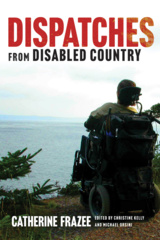
Able to Lead
Disablement, Radicalism, and the Political Life of E.T. Kingsley
Eugene T. Kingsley led an extraordinary life. Born in mid-nineteenth-century New York, in 1890 he was a railway brakeman in Montana. An accident left him a double amputee and politically radicalized, and his socialist activism that followed took him north of the border where he eventually was considered by the government to be “one of the most dangerous men in Canada”.
Able to Lead traces Kingsley’s political journey, starting with his time as a soapbox speaker in San Francisco. As a leading member of the California left, he ran for the US House of Representatives. After moving to British Columbia, he rose to prominence in the Socialist Party of Canada and edited its newspaper, the Western Clarion. Although never elected to political office, Kingsley shaped an entire generation of Canadian leftists. Ravi Malhotra and Benjamin Isitt illuminate a figure who wielded considerable influence in an era when it was uncommon for disabled men to lead. They examine Kingsley’s endeavours for justice against the Northern Pacific Railway, and how Kingsley’s life intersected with immigration law and free-speech rights.
Able to Lead brings a turbulent period in North American history to life, highlighting the implications of this profound legacy for the twenty-first-century political left.
This compelling account will find an audience among labour and leftist historians, advocates for disability rights, and general readers interested in disability and activist history.
The authors’ focus on this historical figure enriches and widens the lens on BC’s history.
Able to Lead... portrays the fractured politics of the B.C. labour left, providing an admiring account of the role of one man in that process… [the book] should achieve its stated goal of encouraging a new perception of the capabilities of disabled people while also prompting a rethink of the early North American left.
Able to Lead paints a vivid picture of a fascinating political figure whose oratory one would have liked to have experienced first-hand.
...the book provides a rich and lively account of a dynamic period in the history of the Canadian left— and tantalizing glimpses of an extraordinary man who lived in the thick of it.
...Malhotra and Isitt are to be commended for a book that, besides providing extraordinarily useful information on subjects ranging from the ubiquity of railway accidents in the late nineteenth century to the influence of eugenics on Canadian immigration policies at the same time, recognizes that Kingsley, even though he never spoke or wrote of his disability, likely constantly had to make decisions, whether about the class struggle or where to live, that reflected its existence in an ablist world.
Ravi Malhotra is a professor in the Faculty of Law and cross-appointed to the School of Rehabilitation Sciences at the University of Ottawa. He is the co-author, with Morgan Rowe, of Exploring Disability Identity and Disability Rights through Narratives: Finding a Voice of Their Own. Benjamin Isitt is a historian and legal scholar based in Victoria, British Columbia. He is the author of From Victoria to Vladivostok: Canada’s Siberian Expedition, 1917–19 and Militant Minority: British Columbia Workers and the Rise of a New Left, 1948–1972, among other publications. Malhotra and Isitt are also co-editors of Disabling Barriers: Social Movements, Disability History and the Law.
Introduction
1 Incident at Spring Gulch: Disablement, Litigation, and the Birth of a Revolutionary
2 California Radical: Fighting for Free Speech and Running for Congress in the Socialist Labor Party
3 Crossing the Line: Eugene Kingsley Arrives in British Columbia
4 No Compromise: Kingsley and the Socialist Party of Canada
5 Kingsley and the State
6 The Twilight Years: Kingsley and the 1920s Canadian Left
Conclusion
Appendix 1: Timeline of the Life and Political Times of E.T. Kingsley
Appendix 2: E.T. Kingsley Election Results
Appendix 3: Partial Record of E.T. Kingsley’s Public Speeches and Lectures
Appendix 4: Obituary for E.T. Kingsley
Notes; Index










